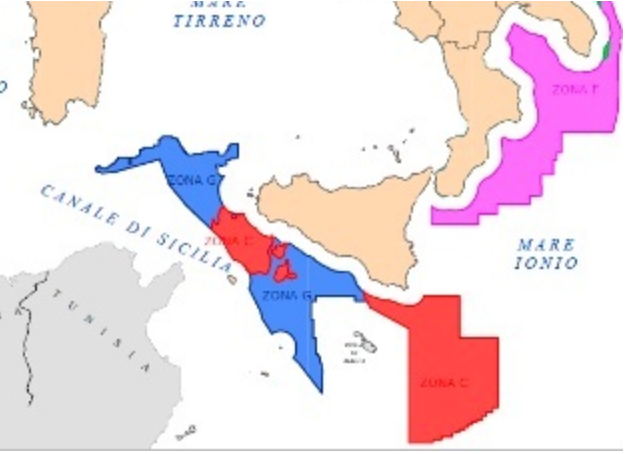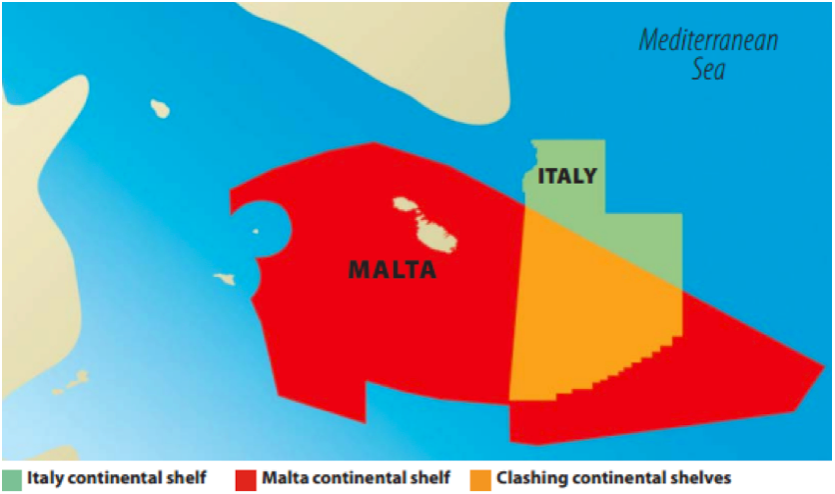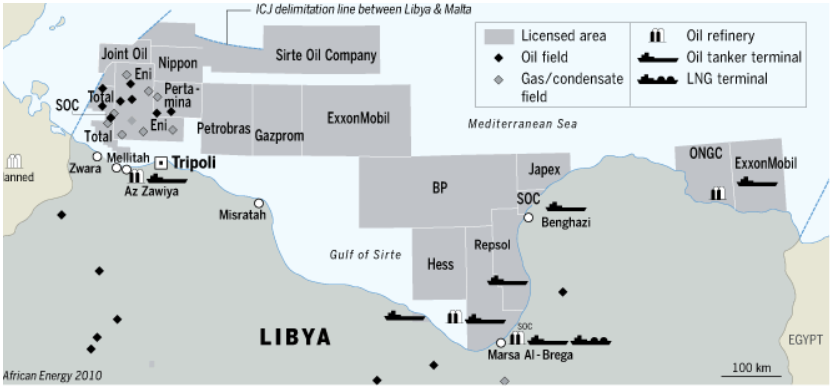Informal Agreement Between Italy, Malta on Moratorium Offshore Sicily
A new chapter has opened in the relations between Italy and Malta: Rome and Valletta agreed "informally" to suspend oil drilling in the Southeastern area of Sicily where the respective claims are overlapped.
The political commitment given by the two Countries allows to glimpse prospects for resolving their long standing dispute on the delimitation of the continental shelf (CS) as well as expresses the always excellent level of their bilateral relations. The agreement must be however followed by the formal delimitation of the maritime boundary. Moreover there is a third party concerned to be considered: Libya, whose continental shelf borders the hypothetical limits of both Italy and Malta's CS.
Background
In 1970 Italy and Malta entered in a provisional arrangement (Modus Vivendi through exchange of letters) concerning the delimitation of the CS between their opposite coasts (North Malta and South Sicily), within the 200 metre isobath. To this aim, a short stretch of an equidistant line was adopted.
The Italian aspirations to reach a final settlement were however disregarded. Some years later Malta unilaterally opened to research a wider area of CS extending beyond the 200 metre isobath.
The limits of this claimed zone were shown in a map presented in 1981 before the International Court of Justice (ICJ) to support Malta's request to intervene in the Tunisia/Lybia Case.
In the meantime, not only did Malta not enter in negotiation with Italy, but tried also to delimit with Libya an area claimed by Italy, South-East off Sicily, requesting the ICJ to do so.
To avoid this, Italy intervened in 1985 before the ICJ in Malta/Libya Case asking the Court take note of its own interest eastwards from the meridian 15°10'. The ICJ indirectly accepted the Italian thesis since, in its judgment, established that the two Countries had to "confine itself to areas where no claims by a third State exist, that is to say, the area between the meridians 13" 50' E and 15" 10' E".
After this Judgment (under which Malta and Libya signed on 10 November 1986 a delimitation agreement) Italy and Malta continued unsuccessfully their negotiations while in the meantime, they sent each other several verbal notes of protest over the disputed area.
Finally Malta presented a proposal for joint exploration with Italy in eastern disputed CS zones. Italy accepted but underlined that implementing it was not possible without a prior definition of areas of respective jurisdiction.
So Italy, as a precondition of such negotiation, approved the Ministerial Decree of December 27, 2012 extending the Research Zone "C" to South-East part of the Italian continental shelf of the Ionian Sea between the 15°10’ meridian (according with the said 1985 Judgment of the ICJ) and the arch of the parallels and meridians lying within the Italy-Greece boundary line.

Fig. 1: Italian Southern Marine Zones open to mining activities (Source: Italian Ministry of Economic Development-Unimig)
Oil drilling Moratorium
The negotiations for a joint exploration agreement failed because Malta granted licence to Heritage Oil Company aiming, as reported by Maltese media, to drill a well in Area 2 and 7, including the Medina Bank, which "is considered to have the highest potential of oil discoveries due to its close proximity to massive offshore fields belonging to Libya and Tunisia". The same area partially falls on the hypothetical Italian CS as well as on that one claimed by Libya.
Italy protested affirming that "no unilateral actions shall be taken by Malta and Italy on the disputed area". Accordingly, on the base of their excellent neighbourly relations, the two Countries informally agreed, at political level, to stop granting oil drilling licences in the disputed area, until a positive solution will be reached.

Fig. 2: Overlapping area South-East Off Sicily (Source Timesofmalta, October 4, 2015). The map does not show the Italian western zones reported in Fig. 1
Such an arrangement amounts to a moratorium, i.e. a sort of provisional confidence building measure aiming to reduce the diplomatic friction on CS disputes, in the spirit of Art. 83, 3 Unclos, under which the States concerned "shall make every effort to enter into provisional arrangements of a practical nature and, during this transitional period, not to jeopardize or hamper the reaching of the final agreement. Such arrangements shall be without prejudice to the final delimitation".
Maritime delimitation as a factor of economic growth
Solving the maritime boundary disputes is essential for the blue economy as well as the energy security (both concepts are part of European Union long term strategy on growth and jobs).
As matter of fact, investors refrain from financing offshore activities in disputed area of CS in order to avoid litigation. In this regard, the "cease and desist" 2008 warning letter that Libyan Government sent to Heritage Oil Company for oil drilling license obtained by Malta on areas 7 of the CS should be remembered.
Since Italy and Malta need for the growth of their economy, to develop the offshore industry, it is evident that the two Countries have no alternative but to enter in constructive negotiations, to be conducted in good faith and with the genuine intention of achieving an equitable solution. Otherwise, If no agreement could be reached within a reasonable period of time, the settlement of the dispute should be assigned to an international court or tribunal having jurisdiction under Unclos, Art. 287.

Fig. 3: Libyan map licensed area as at 2010 (source FT, August 24, 2010)
We should not forget, however, that Malta claims a boundary based on strict equidistance, even though such a line does not comply with the principle of customary law that requires taking into consideration "relevant circumstances" (such as the proportionality of the relevant coasts surrounding the area to be delimited) in order to adjust the theoretical equidistance line.
Needless to say, finally, Italy and Malta should jointly inform Libya, as a third state concerned, of their intentions and initiatives on boundary delimitations. This is a friendly step even more necessary given that the energy security of Libya, as affirmed by UN Security Council in several Resolutions, is a key element for maintaining territorial integrity and security of the Country.
Fabio Caffio


